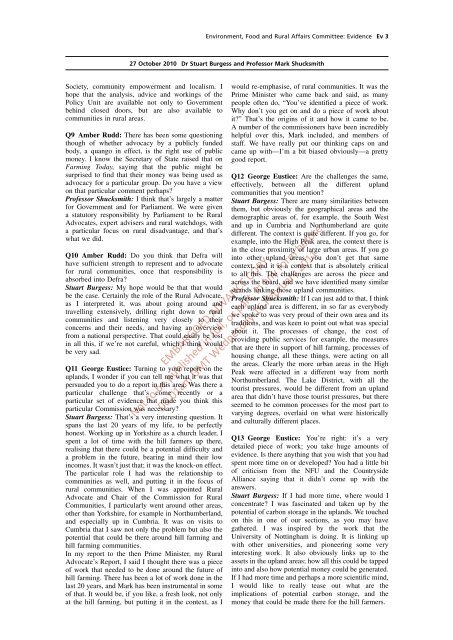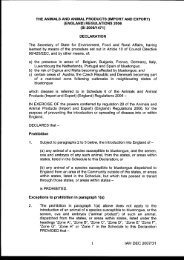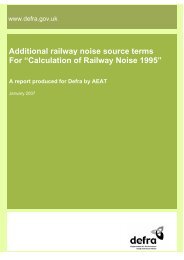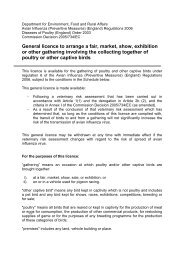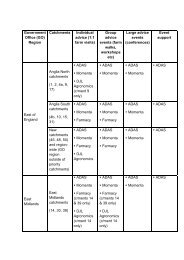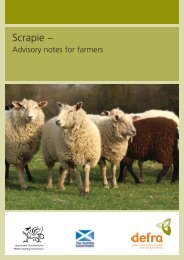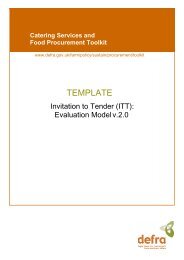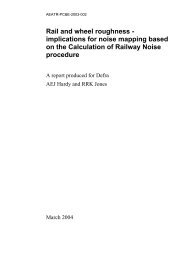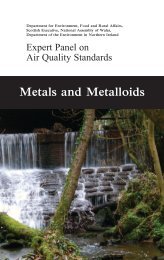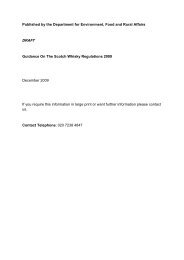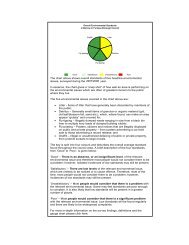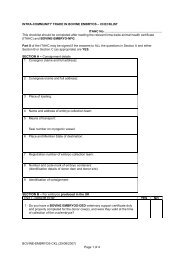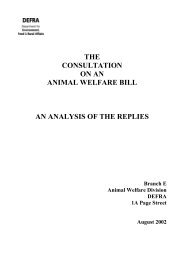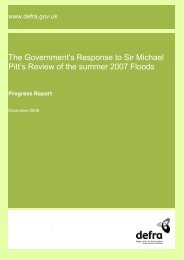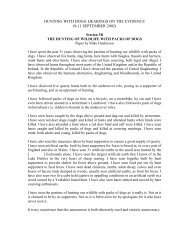Farming in the Uplands - ARCHIVE: Defra
Farming in the Uplands - ARCHIVE: Defra
Farming in the Uplands - ARCHIVE: Defra
You also want an ePaper? Increase the reach of your titles
YUMPU automatically turns print PDFs into web optimized ePapers that Google loves.
Environment, Food and Rural Affairs Committee: Evidence Ev 3<br />
27 October 2010 Dr Stuart Burgess and Professor Mark Shucksmith<br />
Society, community empowerment and localism. I<br />
hope that <strong>the</strong> analysis, advice and work<strong>in</strong>gs of <strong>the</strong><br />
Policy Unit are available not only to Government<br />
beh<strong>in</strong>d closed doors, but are also available to<br />
communities <strong>in</strong> rural areas.<br />
Q9 Amber Rudd: There has been some question<strong>in</strong>g<br />
though of whe<strong>the</strong>r advocacy by a publicly funded<br />
body, a quango <strong>in</strong> effect, is <strong>the</strong> right use of public<br />
money. I know <strong>the</strong> Secretary of State raised that on<br />
<strong>Farm<strong>in</strong>g</strong> Today, say<strong>in</strong>g that <strong>the</strong> public might be<br />
surprised to f<strong>in</strong>d that <strong>the</strong>ir money was be<strong>in</strong>g used as<br />
advocacy for a particular group. Do you have a view<br />
on that particular comment perhaps?<br />
Professor Shucksmith: I th<strong>in</strong>k that’s largely a matter<br />
for Government and for Parliament. We were given<br />
a statutory responsibility by Parliament to be Rural<br />
Advocates, expert advisers and rural watchdogs, with<br />
a particular focus on rural disadvantage, and that’s<br />
what we did.<br />
Q10 Amber Rudd: Do you th<strong>in</strong>k that <strong>Defra</strong> will<br />
have sufficient strength to represent and to advocate<br />
for rural communities, once that responsibility is<br />
absorbed <strong>in</strong>to <strong>Defra</strong>?<br />
Stuart Burgess: My hope would be that that would<br />
be <strong>the</strong> case. Certa<strong>in</strong>ly <strong>the</strong> role of <strong>the</strong> Rural Advocate,<br />
as I <strong>in</strong>terpreted it, was about go<strong>in</strong>g around and<br />
travell<strong>in</strong>g extensively, drill<strong>in</strong>g right down to rural<br />
communities and listen<strong>in</strong>g very closely to <strong>the</strong>ir<br />
concerns and <strong>the</strong>ir needs, and hav<strong>in</strong>g an overview<br />
from a national perspective. That could easily be lost<br />
<strong>in</strong> all this, if we’re not careful, which I th<strong>in</strong>k would<br />
be very sad.<br />
Q11 George Eustice: Turn<strong>in</strong>g to your report on <strong>the</strong><br />
uplands, I wonder if you can tell me what it was that<br />
persuaded you to do a report <strong>in</strong> this area. Was <strong>the</strong>re a<br />
particular challenge that’s come recently or a<br />
particular set of evidence that made you th<strong>in</strong>k this<br />
particular Commission was necessary?<br />
Stuart Burgess: That’s a very <strong>in</strong>terest<strong>in</strong>g question. It<br />
spans <strong>the</strong> last 20 years of my life, to be perfectly<br />
honest. Work<strong>in</strong>g up <strong>in</strong> Yorkshire as a church leader, I<br />
spent a lot of time with <strong>the</strong> hill farmers up <strong>the</strong>re,<br />
realis<strong>in</strong>g that <strong>the</strong>re could be a potential difficulty and<br />
a problem <strong>in</strong> <strong>the</strong> future, bear<strong>in</strong>g <strong>in</strong> m<strong>in</strong>d <strong>the</strong>ir low<br />
<strong>in</strong>comes. It wasn’t just that; it was <strong>the</strong> knock-on effect.<br />
The particular role I had was <strong>the</strong> relationship to<br />
communities as well, and putt<strong>in</strong>g it <strong>in</strong> <strong>the</strong> focus of<br />
rural communities. When I was appo<strong>in</strong>ted Rural<br />
Advocate and Chair of <strong>the</strong> Commission for Rural<br />
Communities, I particularly went around o<strong>the</strong>r areas,<br />
o<strong>the</strong>r than Yorkshire, for example <strong>in</strong> Northumberland,<br />
and especially up <strong>in</strong> Cumbria. It was on visits to<br />
Cumbria that I saw not only <strong>the</strong> problem but also <strong>the</strong><br />
potential that could be <strong>the</strong>re around hill farm<strong>in</strong>g and<br />
hill farm<strong>in</strong>g communities.<br />
In my report to <strong>the</strong> <strong>the</strong>n Prime M<strong>in</strong>ister, my Rural<br />
Advocate’s Report, I said I thought <strong>the</strong>re was a piece<br />
of work that needed to be done around <strong>the</strong> future of<br />
hill farm<strong>in</strong>g. There has been a lot of work done <strong>in</strong> <strong>the</strong><br />
last 20 years, and Mark has been <strong>in</strong>strumental <strong>in</strong> some<br />
of that. It would be, if you like, a fresh look, not only<br />
at <strong>the</strong> hill farm<strong>in</strong>g, but putt<strong>in</strong>g it <strong>in</strong> <strong>the</strong> context, as I<br />
would re-emphasise, of rural communities. It was <strong>the</strong><br />
Prime M<strong>in</strong>ister who came back and said, as many<br />
people often do, “You’ve identified a piece of work.<br />
Why don’t you get on and do a piece of work about<br />
it?” That’s <strong>the</strong> orig<strong>in</strong>s of it and how it came to be.<br />
A number of <strong>the</strong> commissioners have been <strong>in</strong>credibly<br />
helpful over this, Mark <strong>in</strong>cluded, and members of<br />
staff. We have really put our th<strong>in</strong>k<strong>in</strong>g caps on and<br />
came up with—I’m a bit biased obviously—a pretty<br />
good report.<br />
Q12 George Eustice: Are <strong>the</strong> challenges <strong>the</strong> same,<br />
effectively, between all <strong>the</strong> different upland<br />
communities that you mention?<br />
Stuart Burgess: There are many similarities between<br />
<strong>the</strong>m, but obviously <strong>the</strong> geographical areas and <strong>the</strong><br />
demographic areas of, for example, <strong>the</strong> South West<br />
and up <strong>in</strong> Cumbria and Northumberland are quite<br />
different. The context is quite different. If you go, for<br />
example, <strong>in</strong>to <strong>the</strong> High Peak area, <strong>the</strong> context <strong>the</strong>re is<br />
<strong>in</strong> <strong>the</strong> close proximity of large urban areas. If you go<br />
<strong>in</strong>to o<strong>the</strong>r upland areas, you don’t get that same<br />
context, and it is a context that is absolutely critical<br />
to all this. The challenges are across <strong>the</strong> piece and<br />
across <strong>the</strong> board, and we have identified many similar<br />
strands l<strong>in</strong>k<strong>in</strong>g those upland communities.<br />
Professor Shucksmith: If I can just add to that, I th<strong>in</strong>k<br />
each upland area is different, <strong>in</strong> so far as everybody<br />
we spoke to was very proud of <strong>the</strong>ir own area and its<br />
traditions, and was keen to po<strong>in</strong>t out what was special<br />
about it. The processes of change, <strong>the</strong> cost of<br />
provid<strong>in</strong>g public services for example, <strong>the</strong> measures<br />
that are <strong>the</strong>re <strong>in</strong> support of hill farm<strong>in</strong>g, processes of<br />
hous<strong>in</strong>g change, all <strong>the</strong>se th<strong>in</strong>gs, were act<strong>in</strong>g on all<br />
<strong>the</strong> areas. Clearly <strong>the</strong> more urban areas <strong>in</strong> <strong>the</strong> High<br />
Peak were affected <strong>in</strong> a different way from north<br />
Northumberland. The Lake District, with all <strong>the</strong><br />
tourist pressures, would be different from an upland<br />
area that didn’t have those tourist pressures, but <strong>the</strong>re<br />
seemed to be common processes for <strong>the</strong> most part to<br />
vary<strong>in</strong>g degrees, overlaid on what were historically<br />
and culturally different places.<br />
EMBARGOED ADVANCE COPY:<br />
Not to be published <strong>in</strong> full, or part, <strong>in</strong> any form before<br />
00.01am GMT Wednesday 16 February 2011<br />
Q13 George Eustice: You’re right: it’s a very<br />
detailed piece of work; you take huge amounts of<br />
evidence. Is <strong>the</strong>re anyth<strong>in</strong>g that you wish that you had<br />
spent more time on or developed? You had a little bit<br />
of criticism from <strong>the</strong> NFU and <strong>the</strong> Countryside<br />
Alliance say<strong>in</strong>g that it didn’t come up with <strong>the</strong><br />
answers.<br />
Stuart Burgess: If I had more time, where would I<br />
concentrate? I was fasc<strong>in</strong>ated and taken up by <strong>the</strong><br />
potential of carbon storage <strong>in</strong> <strong>the</strong> uplands. We touched<br />
on this <strong>in</strong> one of our sections, as you may have<br />
ga<strong>the</strong>red. I was <strong>in</strong>spired by <strong>the</strong> work that <strong>the</strong><br />
University of Nott<strong>in</strong>gham is do<strong>in</strong>g. It is l<strong>in</strong>k<strong>in</strong>g up<br />
with o<strong>the</strong>r universities, and pioneer<strong>in</strong>g some very<br />
<strong>in</strong>terest<strong>in</strong>g work. It also obviously l<strong>in</strong>ks up to <strong>the</strong><br />
assets <strong>in</strong> <strong>the</strong> upland areas; how all this could be tapped<br />
<strong>in</strong>to and also how potential money could be generated.<br />
If I had more time and perhaps a more scientific m<strong>in</strong>d,<br />
I would like to really tease out what are <strong>the</strong><br />
implications of potential carbon storage, and <strong>the</strong><br />
money that could be made <strong>the</strong>re for <strong>the</strong> hill farmers.


